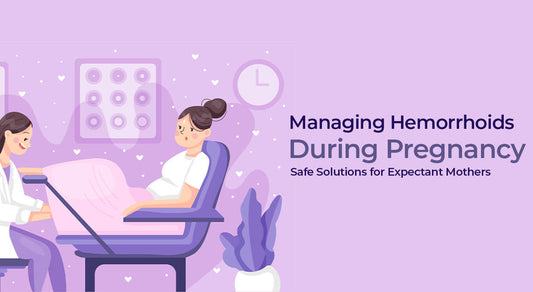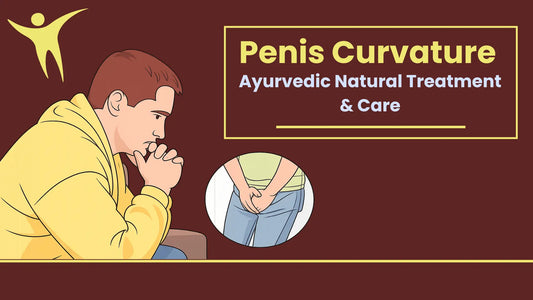
Managing Hemorrhoids During Pregnancy: Safe Solutions for Expectant Mothers
About 30-40% of pregnant women get hemorrhoids, as it is a common condition. Hemorrhoids are a condition of swollen veins in the anus and rectum—it happens during pregnancy and mainly develops in the third trimester, and briefly after childbirth. When you get pregnant, your body goes through a lot of physical changes, and you can get piles (Hemorrhoids).
They can be painful, itchy, or you can bleed, most likely after a bowel movement. Some might experience very painful hemorrhoids during pregnancy. Luckily, it's not dangerous to your baby's health as it's a short-term problem that typically goes away after you give birth to a child. However, it's essential to reduce the symptoms to bring ease during your pregnancy period. We will walk you through the safe solutions to managing hemorrhoids during pregnancy.
What causes hemorrhoids during pregnancy?
Several factors can provoke hemorrhoids during pregnancy. Let's have a look at causes.
- Fetus pressure: When your baby grows in the uterus, it puts stress on your pelvic area and bowel. The extra weight of the fetus pushes the vein in your anus and causes swelling inside your vein.
- Increased blood volume: The amount of blood gets boosted during pregnancy to help the fetus grow. In this way, your veins have to carry out more work to move the blood than average, making them prone to swelling.
- Constipation. Around 16 to 39% of pregnant women get constipation sooner or later. Pregnancy hormone provokes constipation. The constipation increases the chances of you getting hemorrhoid as the expanding uterus presses against the bowel. It slows down the digestive process that regulates regular bowel movements. The waste caught in your bowel puts pressure on your anus vein, making blood movement difficult. One of the reasons for constipation during pregnancy is consuming iron supplements, so it's better to meet your needs through diet.
-
Pressure for a long time: Standing and sitting over an extended time can stimulate hemorrhoids.
How to avoid hemorrhoids during pregnancy
Most of the time, natural ways are best to prevent illness; the same is true with hemorrhoids. You can avoid hemorrhoids during pregnancy by incorporating natural methods. Preventing constipation during pregnancy means preventing hemorrhoids. Here are the natural approaches to avoiding hemorrhoids during pregnancy;
- Add high-fiber food to your diet: take a healthy diet for piles relief, Fiber-rich foods for hemorrhoids include fruits, vegetables, nuts, legumes, seeds, and whole grains. For instance, fruits include raspberries, apples, bananas, oranges, strawberries, and avocados. Fiber-filled vegetables cover broccoli cauliflower, carrot, green peas, and potato. In addition, whole grains consist of quinoa, barley, brown rice, whole-wheat bread, and oat bran. Moreover, legumes, nuts, and seeds include chia seeds, almonds, Split peas, Pistachios, Lentils, and Sunflower kernels.
- Fiber supplement: If you don't consume much fiber from your meal, then feed your body with fiber supplements. It's proven that fiber supplements like Psyllium work best for even chronic constipation. Psyllium is a soluble fiber that aids in softening stool and reducing strain. It's completely safe for pregnant women.
- Exercise: Regular exercise during pregnancy can prevent constipation. Try to perform 30 minutes of physical activity every day to help your digestive system.
- Stay hydrated: Hydrate your body with 8 to 12 glasses daily to support easy bowel movements.
- Don't hold: If you are feeling the drive to use the toilet, then don't hold it long; go for it, as it can cause constipation.
-
Don't sit or stand longer: If you sit for a longer period of time, then it puts pressure on your rectal veins. Therefore, avoid standing or sitting for long periods of time; switch to walking for a few minutes per hour.
How to treat hemorrhoids during pregnancy
Above, we discuss some natural approaches to prevent hemorrhoids or piles; follow all these methods even to treat your hemorrhoids. It's likely that these will treat your hemorrhoids, and these are the fastest ways to get rid of hemorrhoids during pregnancy. Along with these methods, you can treat hemorrhoids with other effective ways as well. Let's take a look;
Ayurvedic Treatment for Hemorrhoids
Ayurveda takes its healing power from natural herbs to treat hemorrhoids effectively. Ayurvedic herbs that effectively regulate normal bowel movement include Haritaki, Jimikand, Nagakesara, Triphala, and Kutaj.
Soaked figs are also recommended for treating piles. Soak figs overnight in warm water, moreover, blend ginger, lemon, and fresh mint in honey to improve digestion.
You can take Ayurvedic medicine for piles that contains herbs like Nagakesara, Kutaj, and Haritaki. We recommend taking the Dr. Piles Free Kit under a doctor's supervision. This is effective, has no side effects, and is certified by the Ayush Department (State Government of Haryana).
Home remedies to treat hemorrhoids
To get relief from discomfort, check out these home remedies for piles relief;
- Use witch hazel to lower itching and pain.
- Apply aloe vera or coconut oil to alleviate little pain or discomfort.
-
Sit in a tub of warm water; it improves your blood circulation and calms the stressed muscle of the anus.
Kegel exercises: Kegel exercises strengthen your pelvic floor muscles—and boost blood circulation in your rectal part. However, it's important to identify your pelvic floor muscles. Follow these steps to identify them.
- Move to the bathroom.
- When urinating, stop the flow midstream and wait for 5 seconds.
- Then calm down for 5 sec, and allow the urine to continue flowing.
- Work out for holding the contraction for 10 sec.
- Repeating the process may take a few attempts to find the right muscle.
-
Do three sets ten times a day.
Kegel exercise also helps you with childbirth and recovery. If you have had a severe painful condition for a long time, then consult with your healthcare provider to get a treatment plan.
Conclusion
In a nutshell, managing hemorrhoids during pregnancy needs safe and effective solutions for expectant mothers. You can ease your discomfort by adopting a healthy lifestyle, such as a high-fiber diet, physical activity, sitz bath, hydration, and Ayurveda herbs. Avoid sitting and standing for long periods; move your body after every hour. Consult a healthcare expert to get personalized advice on your condition and treatment to deal with it.

Dr. Pooja Verma
Dr. Pooja Verma is a sincere General Ayurvedic Physician who holds a BAMS degree with an interest in healing people holistically. She makes tailor-made treatment plans for a patient based on the blend of Ayurveda and modern science. She specializes in the treatment of diabetes, joint pains, arthritis, piles, and age-related mobility issues.



